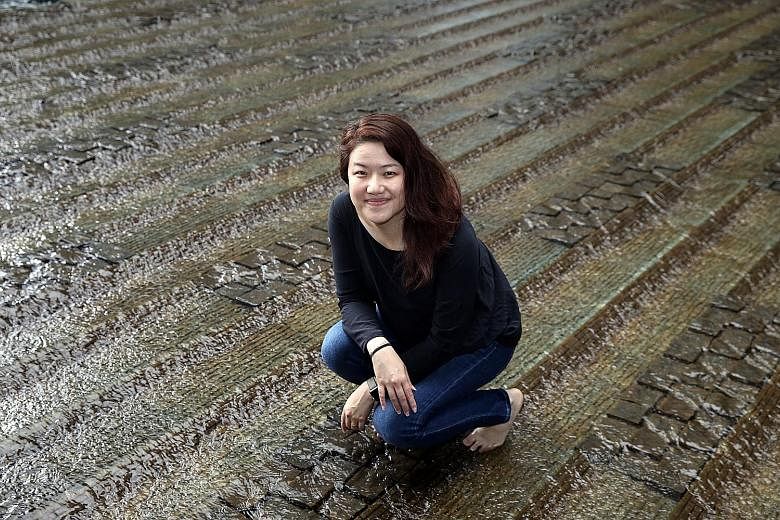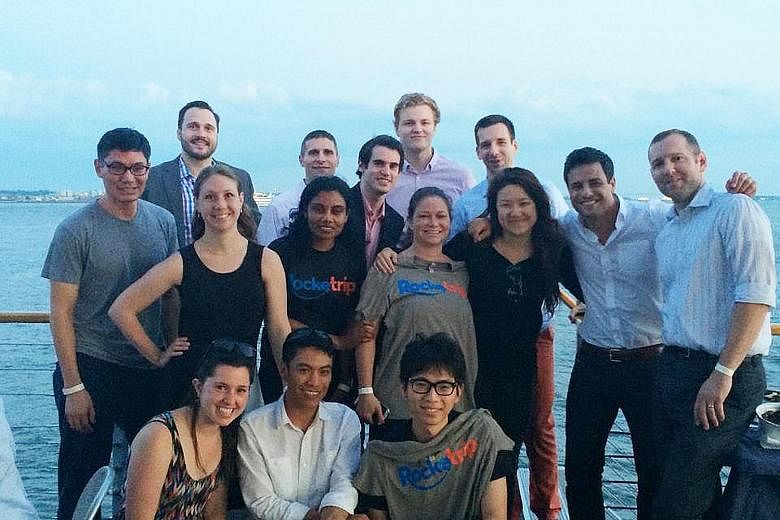Barely 10 minutes into the interview, Miss Gillian Tee is asking for time out and a drink of water.
The 34-year-old had no problems handling the cut and thrust of New York and Silicon Valley technopreneurship for a decade, but talking about her late nanny and maternal grandmother is making her teary and a tad emotional.
"You're good," she says, sheepishly dabbing the tears at the corner of her eyes.
Her late nanny, then a 60-something woman from Kuala Lumpur, practically raised her until she was 10, while her maternal grandmother lovingly cocooned her from the turbulence of her parents' divorce during her teens.
"It was rough, but they were a source of comfort. They had a huge impact on my life," says Ms Tee, adding that she developed a soft spot for the elderly as a result.
This affinity is one of the reasons she gave up a heady career in New York City and Silicon Valley, where she co-founded Rocketrip, a start-up to reduce travel costs, which has raised US$18 million (S$25 million) in funding.
She is now home in Singapore where she has set up Homage, a start-up which connects professional caregivers with seniors who need help.

Miss Tee's road to technopreneurship is hardly typical.
"I was used to years of the top-down method of education, which meant I often hesitated to speak up and struggled to verbalise my opinions and thoughts. I was also born into a conservative Singaporean family and it never occurred to me that starting a business was a viable path for work," she says.
She is the youngest of three girls. Her father is a retired businessman; her mother, a computer science teacher.
The former student of Singapore Chinese Girls' School grew up in East Coast, and led a pretty sheltered and pampered life. But her parents' divorce when she was 15 threw her into a period of uncertainty and insecurity.
"I didn't know what I wanted to do, I lacked focus. I was trying to figure out this whole teenage thing and getting validation from my parents."
After completing her A levels at Raffles Junior College, she left for the University of Melbourne to get a degree in computer science.
"At that time, I had a hunch that I could learn business skills and communication skills further down the line. My mind was younger and fresher and I wanted to learn the harder stuff first," she says.
Upon graduation in 2004, she worked briefly as an artificial intelligence researcher for the university before joining consulting group Accenture as a software engineer, and later, technology consultant.
Although she was one of the company's top performers, she felt restless. "Each time we wrapped up a project, we'd say to the clients: 'Here you go'. You solve all their problems and you give the product back to the client. I learnt a lot but didn't feel I owned anything. I had this desire to build something and own it and see it through from infancy to maturity."
Three years later, she asked for a transfer to New York, a decision that changed her life. The move was prompted by a desire to start living life on her own terms.
"I felt that everything had been planned out for me and I just didn't want to be dependent any more. I wanted to learn things the hard way."
That she certainly did.
On her second day in New York, she was sent to Wall Street to pitch for a project.
"This New Yorker showed up. She looked at me, I looked at her, she asked me some questions... I bombed the interview," she says.
The realisation that she was ill-equipped for the aggressive and frenetic working style of the city hit her hard.
"I grew up in Singapore and studied computer science. I didn't really talk much. I was just a nerd doing a lot of coding, used to receiving information but generally lacking important skills like leading, managing, articulating my thoughts and building consensus.
"I had problems relating to people, I was so green," she says.
She was "put on the bench", the unsavoury tag given to people who could not land any projects on their own.
Labelled a poor performer, she was also sent to a training school to beef up her presentation skills.
"The feedback was that I sucked at presentation. But it was true, I think I really sucked," she says woefully.
In desperation, she contacted an American colleague who had worked well with her in Australia.
"She was looking for someone to work on a project in the Netherlands, which was why I ended up there for nine months," she says.
Although she could have stayed on the project for a few years, she decided to return to New York after nine months because she did not find the work fulfilling. The move, she knew, could sabotage her career since the financial crisis had already started and the New York office was culling poor performers.
True enough, she was fired within a month.
"I was horrified when they told me. There's a difference between what you know and what you experience."
She adds: "They told me they could post me back to Australia or to Canada but I said 'no'. I guess I fired myself."
Subconsciously, she wanted to change her life. Change it she did by throwing herself into a chaotic environment.
The first thing she did was to think through the skills she would need for a new life.
"Not what would look good on paper, but what I would need. I wanted to get good at writing, knowledge of the world and business," she says. "I have done a lot of technology consulting but I really wanted to understand business at the highest level. What does it mean, from a business standpoint, to build something and launch something?"
To improve her communication skills, she took a short stint at the Columbia School of Journalism before buckling down to get a Master of Business Administration (MBA) from Columbia Business School as well as a master's in international affairs from Columbia University.
Going back to college, she says, was intimidating. She moved out from a nice apartment in gentrified 72nd Street, and throughout business school, home was the living room of an apartment in Harlem.
"I struggled a lot but never gave up," says Miss Tee who zealously learnt all she could about entrepreneurship.
She considers her first three years in the US the start of her life.
She recalibrated her perspectives.
"I learnt that the way you approach problems rather than what you know or the skills that you have is more important. There will always be skills which you don't have. But it's the way you handle a situation and the resilience you have which will determine the outcome."
While doing her MBA, she also interned for a year at venture capital firm NYC Seed.
"I learnt how investors look at businesses. I helped my boss screen companies and projects. People would come in to pitch and I'd sit there and take notes. After a while, I started thinking about what was being said and I started to learn."
After completing her MBA, she worked for another fund which invested in technology in the East Coast. The fund director introduced her to Mr Dan Ruch, who was looking for someone who understood technology.
The two hit it off. They became business partners and co-founded Rocketrip, a start-up which helps companies reduce travel spending by sharing the savings with their employees. The idea was openly inspired by Google, which rewards employees who come up with nifty cost-saving travel ideas.
Miss Tee went straight to work, building and then launching a prototype within six months. Launched in 2013, their pilot programs effectively helped companies slash corporate travel expenditure by 20 per cent.
Although rocky in the first year, the company's growth was fast, especially after it was backed by the likes of the Y Combinator, which has been described as the "the world's most powerful start-up incubator." Rocketrip has since attracted about US$18 million in funding.
"We launched, we built, we scaled, and went from two staff to 50 to 60," she says.
Building the company, she says, has been a humbling experience.
"You realise what's really important, more than skills sets, is interpersonal relationship."
Not content to rest on her laurels, she launched Code Upstart, an online coding school, after that.
"The idea is for people to learn how to code by building real apps from zero to launch," she says.
"It's not a company for scaling, it's just to help people do what they need to do to get their product out and test the market," she says.
With Rocketrip cruising along swimmingly, Miss Tee decided to look for another challenge.
"Personally, I've seen how technology can transform a sector. Rocketrip has changed corporate travel. I was looking for something in education or in health," she says.
Attracted by the growth of the tech start-up and venture capital scene in Singapore, she decided to come home after 15 years away.
"At the core of it, I also wanted to be with my mum, who's now 70," says Miss Tee who still has her equity in Rocketrip.
Intrigued by the way the US is using technology to improve senior care, she decided to explore a similar model here. Senior care is increasingly a pressing issue in Singapore, where the proportion of citizens aged 65 and above has climbed up from 8.4 per cent in 2006 to 12.4 per cent last year.
A couple of angel investors she met introduced to her Mr Tong Duong and Ms Lily Phang, who became her co-founders for Homage.
The start-up combines healthcare professionals with smart technology to manage and provide on-demand home caregiving to seniors.
Customers who sign up list their needs; Homage assigns them the appropriately trained caretakers, all of whom are stringently chosen and vetted for their skills.
"It's hard to find a trusted caregiver. I saw that first hand when my nanny was suffering from bone and breast cancer," she says. The idea is also to give caregivers work flexibility and better pay.
Miss Tee built the app in three months and helped to pick the professional caregivers, who now number 250. Users pay between $22 and $25 an hour for basic nursing services, and between $60 and $90 an hour for more specialised nursing care like stoma care and injections.
Homage has grants from the Ministry of Health and DBS Foundation - a corporate foundation that supports social enterprises - and announced last month that it has raised $1.2million in funding.
"We are focusing on Singapore and making sure things go right first. But I definitely see this going beyond Singapore," says Miss Tee.
Meanwhile, she has been giving many talks on technology and entrepreneurship to schools, tertiary institutions and tech forums. It is her way of giving back, she says.
"I'm very plugged in," she says with a laugh. "I have to help build an ecosystem here."



